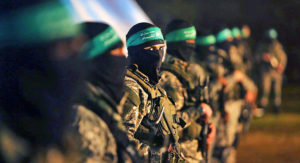For dozens of families in Israel, this weekend will bring joy; for scores of others, it will be bittersweet. Binyamin Netanyahu, meanwhile, will have his own swirl of emotions. The Israeli prime minister will want to take credit for reuniting 50 hostages with their families — but not too much, because the deal is unpopular with some of his Right-wing voters. Joyous scenes of Israelis returning home will be laced with stories of the trauma they have endured, a reminder of the colossal security failure over which Netanyahu presided last month.
Two things have been constant throughout Netanyahu’s long stint in power. He is notoriously indecisive, especially when it comes to military and security matters, and he is obsessed with his political survival. Those characteristics coloured his approach to hostage diplomacy, and to the broader war in Gaza. He is presiding over perhaps the most fateful moment in Israel’s history in half a century, an unprecedented situation that calls for clear, decisive thinking. And he is doing so at a time when he is historically unpopular (and under criminal indictment, to boot).
The agreement between Israel and Hamas began on Friday morning with a truce that will last for four days. Each afternoon, Hamas will release around a dozen hostages; for each one, Israel will release three Palestinians from its jails. After the initial four-day agreement, Hamas has the option to release additional captives. Each 10 that it frees will secure another 24 hours of quiet. It could prolong the lull by days or even weeks if it was so inclined.
It took weeks of negotiations to reach this point. At first Hamas leaders pushed an “all-for-all” deal: all of the hostages in exchange for all of the Palestinians in Israeli jails (they numbered about 5,200 before the war). On October 20 it did release two hostages, a mother and daughter with dual American-Israeli citizenship. That was a result of American pressure on Qatar, the tiny Gulf state that hosts some of the Hamas leadership. Three days later, it released a pair of elderly Israeli women — ostensibly as a humanitarian gesture, more likely as a public-relations move and a way to put pressure on the Israeli government.
Then Israel began its ground offensive in Gaza, and the negotiations changed. Instead of “all-for-all”, Hamas wanted to trade hostages for a truce. Israel was open to the idea, but only if the number was substantial: at least 100 captives. Yahya Sinwar, the leader of Hamas in Gaza, wanted a lower number and refused to budge. That led to disagreements within the Israeli government.
The centrist members of Netanyahu’s war cabinet — Benny Gantz and Gadi Eisenkot, both former army chiefs — wanted to continue negotiating a smaller deal. So did David Barnea, the Mossad director, who represented Israel at the talks in Qatar. On the other side were Yoav Gallant, the defence minister, and the heads of the army and the Shin Bet security service. They wanted to keep fighting and argued that progress in the military campaign would help their position at the negotiating table.
Netanyahu, as is his wont, decided not to decide. A similar deal was on the table last week, but the prime minister decided not to bring it to a vote in the cabinet, only to reverse himself days later. What changed in the intervening time was pressure — some of it from America, but mostly from the families of the hostages in Israel.
From the start, those families have complained of inattention from Netanyahu’s government. The places that were attacked on October 7, and from which many of the hostages were taken, are not home to many Netanyahu voters. While the kibbutzim are not quite the socialist bastions of yore, they still lean Left. In Nahal Oz, a village on the Gaza border, Netanyahu’s Likud party received just 10% of the vote in last year’s election, compared to 23% nationwide. In nearby Be’eri it won less than 3%.
It took the prime minister more than a week to meet with them. When Joe Biden visited Israel last month, some Israelis marvelled at the scene: an elderly American president flew halfway around the world and showed more compassion for the families of Israeli hostages than their own prime minister had.
He stood in stark contrast with the coordinator Netanyahu appointed to oversee the hostage issue, Gal Hirsch — an army general who was forced to resign in 2006 because of his failures during the war in Lebanon. His main qualification for the job is that he is a Netanyahu crony and Likud activist. At a meeting with foreign diplomats last month, he berated them for supporting the Oslo Accords and suggested they were complicit in Hamas’s atrocities. “It’s time to wake up,” he yelled while pounding on the podium — a curious way for an Israeli official to build international support.
And so the families were left to fend for themselves, joining together to lobby Israeli officials and foreign leaders. They enlisted David Meidan, a former Mossad officer who negotiated a hostage deal with Hamas in 2011, to serve as an informal consultant. And they organised a protest march from Tel Aviv to Jerusalem to put pressure on the government.
They won over hearts and minds, but not the political establishment. Some Right-wing lawmakers are furious about the deal: they do not want Israel to make concessions, certainly not a truce (which could give Hamas militants time to regroup) or the release of Palestinian prisoners. It took weeks of intense pressure from the families to convince Netanyahu to prioritise their needs.
Such politicking has been a constant throughout the war. In the days after October 7, Netanyahu’s political and media allies put out a stream of messages that sought to place the blame on the army and security services. The prime minister was not to blame for the calamity, the generals were — a remarkable message to brief during wartime.
Then he dithered about whether to approve a ground offensive. The army called up 360,000 reservists, which brought parts of the economy to a standstill, and deployed them near to the border with Gaza. There they waited, for days and days. Officers grumbled that they could not keep soldiers at high readiness for much longer. Another jarring message came from Netanyahu’s camp: the army wanted to throw ground troops into the meat grinder of urban warfare before the air force had time to soften up northern Gaza. The intended message was that Netanyahu cared about the lives of soldiers; the generals did not.
The Israeli public, however, is not buying it. An October poll by the Israel Democracy Institute (IDI), a non-partisan think-tank, asked Israelis who they trust more to run the war: Netanyahu or the army chiefs. 55% of Israeli Jews chose the army, while just 7% said the prime minister (the rest were split between “both” or “neither”). Even among Right-wing Jews, the army had a 31-point advantage.
This unpopularity has bred insecurity, and the fear of losing his base still overshadows every decision Netanyahu makes. Members of his coalition have variously talked about rebuilding the Israeli settlements in Gaza, which were evacuated in 2005; expelling Gaza’s population to tent cities on Egypt’s Sinai peninsula; and dropping a nuclear bomb on the enclave. A sensible prime minister would shut down such talk, which angers Israel’s allies and feeds a global narrative that it is committing a genocide in Gaza. But Netanyahu has not: better to risk Israel’s standing in the world than his standing with Israel’s Right wing.
A more recent IDI poll found that 63% of Israelis (including 52% of Right-wing Jews) think the Government has no plan for what comes after the war. They are probably right. America and some Arab states would like to see the Palestinian Authority (PA) return to power in Gaza after the war. This idea is probably far-fetched. The PA is already losing control over parts of the occupied West Bank; it is too weak and unpopular to effectively govern Gaza. But it is the only alternative, however unlikely, to a prolonged Israeli occupation of the enclave.
Netanyahu, though, has ruled it out in multiple public statements. Right-wing voters do not like the PA — one nationalist group put up a billboard in Tel Aviv showing Mahmoud Abbas, the Palestinian president, wearing a Hamas headband — and that is enough to scotch the idea.
For all his pandering to his base, though, it is hard to see how Netanyahu survives the next election. His prospects were shaky even before October 7, after a year of political turmoil caused by his controversial effort to hobble the supreme court. Now they look dismal. A survey published by Ma’ariv on Friday found that Likud would win just 18 seats, down from 32 in last year’s election. Gantz’s centre-right party, on the other hand, would swell from 12 seats to 43.
The final result may look different. Some of the Israelis who now support Gantz may end up voting for other candidates, such as Naftali Bennett, the former prime minister now mulling a return to politics. No one can predict the future mood of the electorate, though everyone thinks it will be in their favour. Last month, a prominent centrist lawmaker told me the war would swing Israelis to the centre, while a far-Right member of Netanyahu’s coalition said it would strengthen the Right.
Still, the trend is clear: survey after survey shows Netanyahu’s personal support has collapsed, with even Right-wing voters saying they will abandon his coalition and vote for change. For now, Israelis will spend the weekend fixated on a rare bit of good news. But when the truce ends, scores of hostages will still be in captivity, a brutal war will grind back to life, and the country’s political divisions will be just as stark as before.
Disclaimer
Some of the posts we share are controversial and we do not necessarily agree with them in the whole extend. Sometimes we agree with the content or part of it but we do not agree with the narration or language. Nevertheless we find them somehow interesting, valuable and/or informative or we share them, because we strongly believe in freedom of speech, free press and journalism. We strongly encourage you to have a critical approach to all the content, do your own research and analysis to build your own opinion.
We would be glad to have your feedback.
Source: UnHerd Read the original article here: https://unherd.com/






